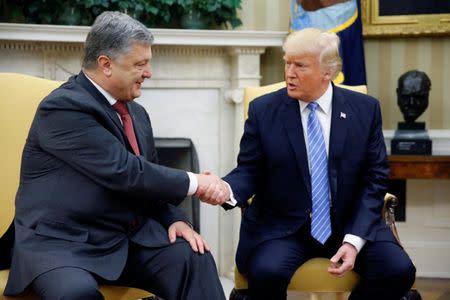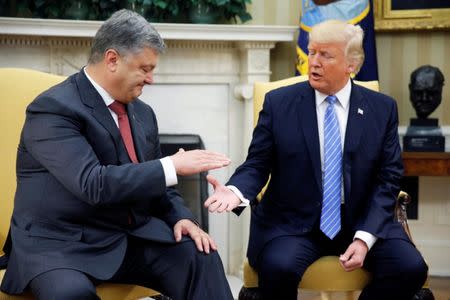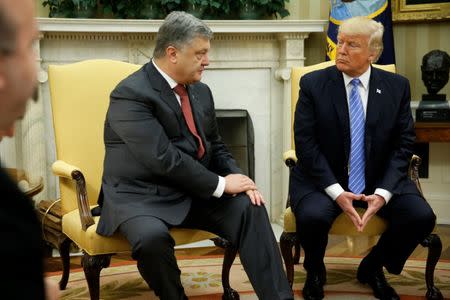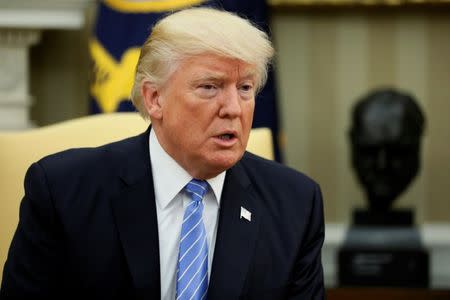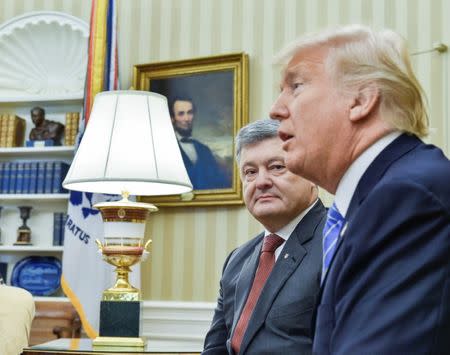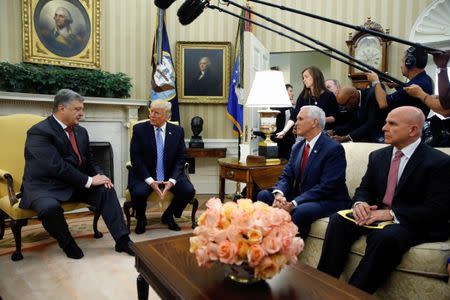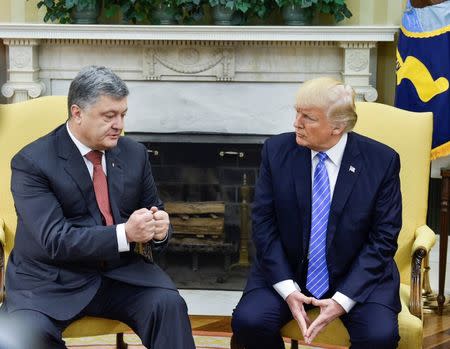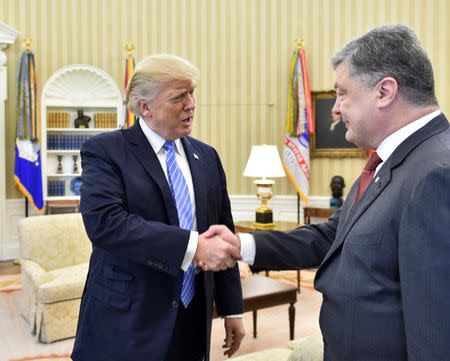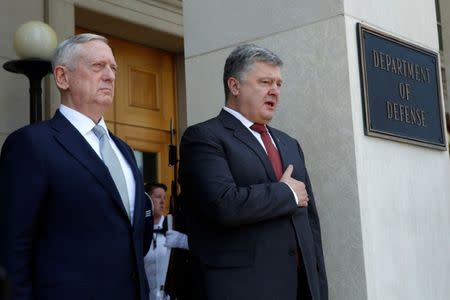Trump meets Ukraine's president, U.S. adds to Russia sanctions
By Steve Holland and Joel Schectman WASHINGTON (Reuters) - President Donald Trump met with Ukraine's president on Tuesday and expressed support for a peaceful resolution to the conflict in eastern Ukraine but said nothing about Russia's role, while the U.S. government added to sanctions over Moscow's actions. Trump sat down in the Oval Office with Ukrainian President Petro Poroshenko for talks on the same day the U.S. Treasury Department added two Russian officials and 36 other individuals and entities to its list of those facing sanctions over Moscow's activities in Ukraine. Trump's meeting with Poroshenko was officially called a "drop-by" visit after the Ukrainian leader's separate session with Vice President Mike Pence. With TV cameras rolling, Trump said "a lot of progress has been made" between the two countries and that the pair had "very, very good discussions." The sanctions target Ukrainian and Russian officials and companies that U.S. authorities accuse of helping Russia tighten its grip on the Crimean peninsula, a part of Ukraine annexed by Russia in 2014 in a move Western leaders denounced as illegal. Poroshenko called Trump, whose first five months in office have been dogged by a controversy over whether his presidential campaign team last year colluded with Russia, "one of the most reliable supporters" and "strategic partners" for Ukraine. In a statement issued after Trump's meeting, the White House said the discussion centered on "support for the peaceful resolution to the conflict in eastern Ukraine and President Poroshenko's reform agenda and anti-corruption efforts." A separate White House statement issued after Pence met with Poroshenko said the vice president highlighted continuing U.S. support for implementing the Minsk agreement, the 2015 accord aimed at ending Russian support for separatist rebels in eastern Ukraine. Last week, Secretary of State Rex Tillerson said the United States could back away from that agreement to avoid being "handcuffed" by the policy. Trump did not mention the accord. Before Trump's meeting with Poroshenko, the Treasury Department made its announcement about sanctions over Russia's actions in Ukraine that were being taken to keep pressure on Moscow to reach a diplomatic solution in Ukraine. A Treasury Department statement said, "U.S. sanctions related to Crimea will not be lifted until Russia ends its occupation of the peninsula." Treasury Secretary Steven Mnuchin said in the statement "there should be no sanctions relief until Russia meets its obligations under the Minsk agreements." LAVROV CITES U.S. 'RUSSOPHOBIA' Speaking at a joint news briefing in Moscow with his French counterpart, Russian Foreign Minister Sergei Lavrov called the new sanctions "regrettable" and said that "Russophobia" in the United States was raging "beyond all bounds." On Monday, Russia threatened to shoot down U.S. warplanes over Syria after a U.S. Navy fighter shot down a Syrian warplane. Poroshenko, speaking to reporters after his session with Trump, said he came away pleased with what he called a "full, detailed meeting." He also held talks with Tillerson and Defense Secretary Jim Mattis. "We received strong support from the U.S. side, support in terms of sovereignty, territorial integrity and the independence of our state," Poroshenko said. At the Pentagon, Mattis noted the "severe casualties" Ukraine has suffered in its conflict with Russian-backed separatists. "The United States stands with you. We support you in the face of threats to sovereignty, to international law or to the international order," Mattis said. Poroshenko expressed hope for expanded U.S.-Ukrainian cooperation but did not directly answer a question about whether it was time for the United States to start providing lethal arms to Ukraine. The somewhat neutral body language between Trump and Poroshenko contrasted with chummy photos that emerged from the U.S. president's meeting last month at the White House with Lavrov and the Russian ambassador to the United States, Sergei Kislyak. Trump has said he wants better relations with Russia, but his goal has been complicated by tensions between the two countries over Syria and by opposition among many of his fellow Republicans in Congress to warmer ties with Moscow. The U.S. Senate passed legislation last week that would impose new measures against Russia and limit Trump's ability to roll back sanctions against that country in the future. In a little more than two weeks, Trump is due to hold his first meeting as president with Russian President Vladimir Putin on the sidelines of a G20 summit in Hamburg, Germany. Trump has found himself on the defensive politically over investigations into alleged Russian meddling in the 2016 U.S. presidential election. His former campaign manager, Paul Manafort, previously worked on behalf of the political party of Viktor Yanukovich, the former Kremlin-backed leader of Ukraine. (Additional reporting Phil Stewart in Washington, Alessandra Prentice in Kiev and Maria Kiselyova in Moscow; Editing by Caren Bohan and Will Dunham)
